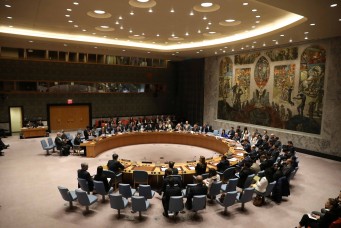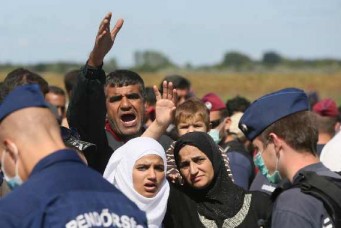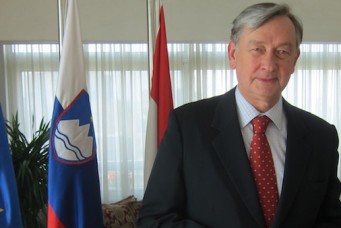The Olympics and International Relations
The Tokyo games illustrated how much the world is inter-connected. How and what can countries learn from the Olympic moment?

Flagbearers during the closing ceremony of the Tokyo 2020 Olympics Closing Ceremony. August 8, 2021. Maxim Shemetov/Reuters
The 32nd Olympic games in Tokyo began one year after they were initially scheduled due to the COVID-19 pandemic and the complications it posed. For the most part, the past tournaments have convened regularly; the only exceptions were in 1916, 1940, and 1944 when they coincided with the two World Wars. At other times, the Olympics was held under difficult political circumstances. In the 1936 Berlin Olympics, for example, Hitler used the games as a platform to showcase the superiority of the German-Aryan race. This greatly clashed with both ascendent notions of social solidarity at the time and liberation movements struggling against European colonialism. In 1980, the Moscow games took place while the Soviet-Afghan war was in full force, which the United States boycotted in protest.
Pierre de Coubertin established the modern Olympics as an organization for international sports competition, far removed from politics. Although Coubertin’s ambitions and dreams have been largely realized, the Olympics has not always fully succeeded in isolating itself from politics. In 1933 for example, the German leadership was reluctant to attend the gold medal ceremony of Jesse Owens, the famed African American runner, on account of his race, despite being treated with respect and sportsmanship by his German competitor and silver medalist, Carl Ludwig “Luz” Long. At times, individual action has transcended the political situation. In 1968, during the medal ceremony, the two American runners Tommie Smith and John Carlos, raised their fists in a black-power salute, protesting the abuse and racism rampant in their country. Over the years, regional rivalries have also played out on the Olympic arena, particularly between the Arabs and Israelis.
It is naïve to expect sports and social events of this size and magnitude to remain isolated from the conditions that impact countries, communities, peoples, and individuals at a specific place and time. Politics, the economy, and social and security issues affect one another, and increasingly so in the age of globalization. The Tokyo games highlighted how connected and inter-dependent the world really is. The issues of our era are truly global in nature, so much so that any attempt to separate states from each other, however large the barriers, is futile. The fact that the tournament was postponed and then convened without spectators and crowds is evidence that contemporary issues raised by the pandemic affect everyone. Solutions to these issues require collective and comprehensive engagement, particularly in matters of the environment, health, natural resources, and desertification, which are not confined to borders and exercise no restraint in the scale of damage they can cause.
There are other useful lessons to learn from the Tokyo games. As athletes must adhere to tenet of honorable, friendly competition, so too must those same principles become embedded in the relations of states with each other. Athletes agree to accept the outcome of competition, whether that is a win or a loss. They agree to respect the game’s rules, such as staying inside set boundaries like lanes in swimming or accepting penalties in soccer—these constitute the shared, agreed-upon rules and rights of their sport. Similarly, the international system itself requires rules such as state sovereignty in order to function properly. As of late, China’s ascendancy to the second largest economy in the world at the expense of Japan was a test of that system. However, Beijing’s economic competition with the United States is a fiercer, more contentious issue because it brings to the fore concepts of American exceptionalism, which runs counter to multilateralism.
Every system is liable to adjustment. Even the International Olympic Committee, for example, has added new sports to the roster of permitted games. So does the international governance system renew its laws and rulers and has set forth individual human, social, and economic rights, despite its establishment as a system that regulates relations between nation states. This system should be further adjusted to achieve a fairer balance among countries—one example would be to modify how membership is established within the U.N. Security Council—and between individual and social rights to guarantee that stability is preserved. The striking imbalance in the distribution of COVID-19 vaccines internationally, most especially in Africa, is an example of inequitable international conduct at the detriment of earnest efforts to create a sound and stable international order.
With regards to the athletes present this year at the Olympics, there have been two issues. First, the participation of Palestinian and Syrian athletes on the Refugee Olympic Team reminds us once again of contested regional conflicts. They represent some of the largest and oldest refugee diasporas globally. It is time for real efforts to address the plight of these two Arab populations. Second, more and more athletes are afflicted by mental health issues. World gymnastics champion, Simone Biles, withdrew from the Olympics to focus on her mental health. The Japanese tennis champion Naomi Osaka withdrew from the French Open, citing depression.
When mental health issues translate on a larger, political scale, it demands our attention. The upheavals in Eastern Europe of the 1990s, the Arab world in the 2010s, as well as anti-police brutality protests in the United States last year, reflect a general societal unease about governance. The psychological and mental wellbeing of citizens can be realized through looking after their interests and striving for justice. This must not be ignored, no matter how powerful or rich societies become. One pathway is efficient and rational political rule that is in tune with the people and their needs.
Athletes from the island of Bermuda and San Marino who clinched bronze and silver medals—even as representatives of the smallest countries in the Olympics—embody a story of hope and optimism. For individuals and small countries facing large ones, this victory shows that seemingly unattainable dreams can be realized through determination and a disciplined work regime. One can learn from East Asian communities, who have proved themselves in the fields of technology and science, both in their home countries and the diaspora working in the major industrial countries. Their success is a testament to their personal discipline and commitment. The remarkable economic success and social integration of the small peninsula of Singapore is another case from which to learn.
The international community faces a long marathon of challenges and obstacles before it can achieve in international relations what de Coubertin achieved for the Olympics. Yet, perhaps we can emerge from this Olympic moment—held with protective measures, social distancing, and a few spectators—with the deep-rooted conviction that many of the dangers our world is facing are shared and that dealing with them requires work, cooperation, and sincere competition, all in the pursuit of a balance between the interests of the individual, the nation, and the global community.
Nabil Fahmy is a former foreign minister of Egypt. He is also Dean Emeritus and Founding Dean of the School of Global Affairs and Public Policy at the American University in Cairo. He served as Egypt’s ambassador to the United States from 1999 to 2008, and as envoy to Japan between 1997 and 1999. On Twitter: @DeanNabilFahmy.
Read More



